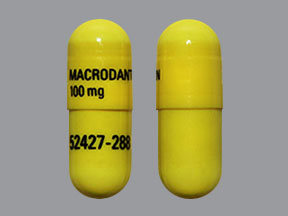Macrodantin
Generic name: nitrofurantoin [ NYE-troe-fure-AN-toyn ]
Brand names: Macrobid, Macrodantin
Drug class: Urinary anti-infectives
What is Macrodantin?
Macrodantin is an antibiotic that is used in adults and children at least 1 month old to treat or prevent urinary tract infections caused by certain bacteria.
Macrodantin may also be used for purposes not listed in this medication guide.
Macrodantin side effects
Get emergency medical help if you have signs of an allergic reaction (hives, difficult breathing, swelling in your face or throat) or a severe skin reaction (fever, sore throat, burning eyes, skin pain, red or purple skin rash with blistering and peeling).
Macrodantin can cause rare but serious lung problems. Call your doctor at once if you have: feeling short of breath on exertion, wheezing, chest pain or discomfort, dry cough or hack, feeling weak or tired, loss of appetite, rapid weight loss, chills, or fever.
Macrodantin may cause serious side effects. Call your doctor at once if you have:
-
severe stomach pain, diarrhea that is watery or bloody (even if it occurs months after your last dose);
-
pain and burning when you urinate;
-
numbness, tingling, or burning pain in your hands or feet;
-
pale skin, confusion or weakness; or
-
liver problems--loss of appetite, nausea, vomiting, stomach pain (upper right side), tiredness, itching, dark urine, clay-colored stools, jaundice (yellowing of the skin or eyes).
Common side effects of Macrodantin may include:
-
nausea, vomiting, loss of appetite;
-
unusual or involuntary eye movements;
-
lung or liver problems;
-
rash, itching;
-
numbness, tingling, or burning pain in your hands or feet;
-
gas; or
-
abnormal blood tests.
This is not a complete list of side effects and others may occur. Call your doctor for medical advice about side effects. You may report side effects to FDA at 1-800-FDA-1088.
Related/similar drugs
Warnings
You should not take Macrodantin if you have severe kidney disease, urination problems, or a history of jaundice or liver problems caused by this medicine.
Do not take Macrodantin during late pregnancy (from 38 weeks through delivery).
Before taking this medicine
You should not take Macrodantin if you are allergic to it, or if you have:
-
a history of jaundice or liver problems caused by taking Macrodantin;
-
problems with urination (little or no urination); or
-
severe kidney disease.
Do not take Macrodantin during late pregnancy (from 38 weeks through delivery).
Do not give Macrodantin to children younger than 1 month old.
Tell your doctor if you have or ever had:
-
anemia (low red blood cells);
-
an electrolyte imbalance or vitamin B deficiency;
-
a genetic enzyme deficiency called glucose-6-phosphate dehydrogenase (G6PD) deficiency;
-
any other medical condition;
-
liver problems; or
-
kidney disease.
It is not known if Macrodantin will harm an unborn baby. Tell your doctor if you are pregnant or plan to become pregnant.
You should not breastfeed a baby under 1 month old or who has a glucose-6-phosphate dehydrogenase (G6PD) deficiency.
How should I take Macrodantin?
Follow all directions on your prescription label and read all medication guides or instruction sheets. Use the medicine exactly as directed.
Your dose needs may change if you switch to a different brand, strength, or form of this medicine. Avoid medication errors by using exactly as directed on the label, or as prescribed by your doctor.
Take with food.
Doses are based on weight in children. Your child's dose may change if the child gains or loses weight.
Shake the oral suspension (liquid). Measure a dose with the supplied measuring device (not a kitchen spoon).
Keep using this medicine even if your symptoms quickly improve. Skipping doses could make your infection resistant to medication. Macrodantin will not treat a viral infection (flu or a common cold).
Call your doctor if your symptoms do not improve, or if they get worse.
Macrodantin may darken your urine to a brown color. This is normal and is not harmful.
This medicine can affect the results of certain medical tests. Tell any doctor who treats you that you are using Macrodantin.
If you use this medicine long-term, you may need frequent medical tests including blood tests to check your kidney function.
Antibiotic medicines can cause diarrhea. Tell your doctor if you have diarrhea that is watery or bloody.
Store tightly closed at room temperature, away from moisture and heat. Protect from light. Use the oral suspension within 30 days. Throw away any medicine not used within that time. Do not freeze the oral suspension.
What happens if I miss a dose?
Take the medicine as soon as you can, but skip the missed dose if it is almost time for your next dose. Do not take two doses at one time.
What happens if I overdose?
Seek emergency medical attention or call the Poison Help line at 1-800-222-1222.
What should I avoid while taking Macrodantin?
Ask your doctor before taking an antacid that contains magnesium trisilicate, and take only the type your doctor recommends.
What other drugs will affect Macrodantin?
Tell your doctor about all your other medicines, especially:
-
probenecid; or
This list is not complete. Other drugs may affect Macrodantin, including prescription and over-the-counter medicines, vitamins, and herbal products. Not all possible drug interactions are listed here.
Frequently asked questions
More about Macrodantin (nitrofurantoin)
- Check interactions
- Compare alternatives
- Pricing & coupons
- Reviews (49)
- Drug images
- Side effects
- Dosage information
- During pregnancy
- Generic availability
- Drug class: urinary anti-infectives
- Breastfeeding
- En español
Patient resources
Other brands
Professional resources
Other brands
Related treatment guides
Further information
Remember, keep this and all other medicines out of the reach of children, never share your medicines with others, and use this medication only for the indication prescribed.
Always consult your healthcare provider to ensure the information displayed on this page applies to your personal circumstances.
Copyright 1996-2025 Cerner Multum, Inc. Version: 11.01.

